Did you know that older adults can be highly susceptible to malnutrition? That’s right. Not only is it prevalent in older adults, but it also poses a major health concern. Malnutrition in older adults often results in adverse outcomes such as sickness and even death. Unfortunately, it is often unrecognized or misdiagnosed. It is important for you to be conscious about the food you eat and how often you eat. A breakfast for champions is recommended. Remember what you have always heard, breakfast is the most important meal of the day.
How prevalent is malnutrition in older adults?
According to studies, about 60% of hospitalized older adults are malnourished, while 35-85% of seniors in long-term care facilities are experiencing malnutrition. The American Academy of Family Physicians further noted that malnutrition is a predictor of mortality in older adults. Several factors actually account for malnutrition:
- Appetite loss – you don’t feel that hungry anymore. This could be due to physical or emotional factors. Living alone or being in a care facility away from your family might leave you depressed so you feel less hungry.
- Lack of mobility may prevent you from preparing food.
- Changes in taste and smell – this is normal as you age especially when you’re taking different medications.
- A decrease in your body’s ability to absorb nutrients.
- Difficulty in chewing and swallowing food so you take in less food and nutrients.
Therefore, it is very crucial that you don’t skip breakfast. That meal often has many of the nutrients you need each day.
Why do you need a breakfast for champions?
Many older adults eat less food in one sitting than they used to. If you think you belong to this category, remember that you basically need to meet your caloric requirement throughout the day. Skipping even just one meal can make it harder for you to get all the calories and nutrients you need daily. Having a breakfast for champions can aid you in your quest to remain strong and healthy. Here are a few other reasons why you need to incorporate breakfast into your daily dietary routine:
- Breakfast kick-starts your metabolism.
- It decreases your tendency to overeat in the evening.
- Older adults tend to have bigger appetites earlier in the day.
- You get more vitamins, minerals, and other nutrients in your diet.
- It helps regulate your bowels and stimulate your taste buds.
- It assists you in taking medications you need to take in the morning.
Here are some great breakfast recipes for an energy-filled day:
1. Oatmeal with Fruit
While easy to prepare and chew as well as being inexpensive, oatmeal is packed with fiber and nutrients. A high-fiber diet offers loads of benefits including:
- Lowered cholesterol levels
- Blood sugar regulation
- Healthy bowel movement
- Healthy weight
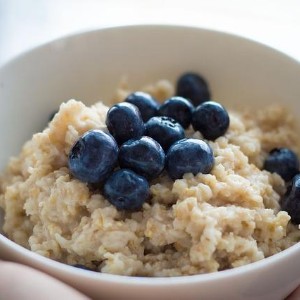
The Institute of Medicine recommends that men 50 and above take in at least 30 grams of fiber while women 50 and above are advised to take in at least 21 grams of fiber each day.
Add a handful of blueberries into your bowl of oatmeal for a more enhanced flavor while getting additional loads of nutrients from them. Blueberries have been classified as superfoods so including them in your diet would give you the extra health boost that you need.
To add variety to your oatmeal, you may add different kinds of fruits such as bananas, apples, and strawberries.
2. Eggs

As a rich protein source, eggs are an excellent breakfast choice for older adults. Seniors may have high protein requirements. It is recommended that 0.68 grams of protein per pound each day are consumed.
Not only a rich source of protein, but eggs are also packed with certain vitamins and minerals including Vitamin A, Vitamin B5, Vitamin B2, Vitamin B12, Phosphorus, Folate, and Selenium. They also contain antioxidants such as Lutein and Zeaxanthin. These improve eye health and prevent certain eye conditions like cataracts as well as macular degeneration.
Supported by several studies, eggs have been found to raise good (HDL) cholesterol levels thus lowering the risk of heart disease, stroke, and other illnesses. Many studies have been conducted to establish the relationship between egg consumption and the risk of heart disease and stroke. One study involving almost 300,000 participants, demonstrated that there was no significant link found between the two. Generally, up to 3 whole eggs may be eaten per day. More studies may be necessary to verify all claims.
3. Smoothies
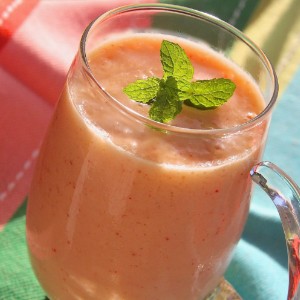
Smoothies make a great breakfast they are packed with vitamins and minerals as well as tasting good. Plus they are so easy to prepare. Simply toss everything into the blender and you’re done.
Smoothies are low in calories yet rich in fiber. Unlike extracting juices, smoothies are prepared using a whole fruit or vegetable. All the fibers are included in the mix so drinking it makes you feel like you’ve eaten a full meal. And since it’s already in liquid form, it makes it easy for your body to digest so it no longer has to exert too much effort in breaking down your food.
Visit AllRecipes to find many smoothie recipes.
4. Spinach Pie
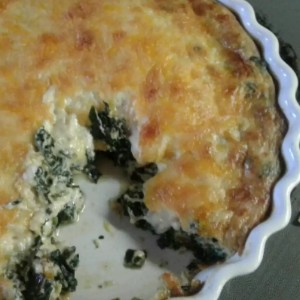
Spinach is low in calories and a rich source of antioxidants, vitamins (A, B2, C, & K), and minerals (potassium, iron, calcium, folate, magnesium, and manganese). Spinach is also a good source of protein.
Some benefits of spinach in the diet include:
- Lowered blood pressure
- Improved bone health
- Reduced risk of asthma, cancer, and diabetes
- Improved blood glucose levels
- Healthy skin and hair
- Improved metabolism
- Improved immune system
Here’s a simple crustless spinach pie recipe:
Ingredients:
- 2 large eggs
- 2 tablespoons butter
- 2 cloves of garlic, minced
- 2 cups fresh spinach, chopped
- 4 ounces mozzarella
- ½ cup flour
- ½ cup milk
- ½ teaspoon baking powder
Instructions:
- Preheat oven to 350 degrees.
- Melt butter in an 8-inch baking pan.
- Beat eggs well.
- Add flour, milk, garlic, and baking powder.
- Add in cheese and spinach.
- Pour into the baking pan.
- Bake for 30-35 minutes or until cheese turns slightly golden brown.
5. Banana and Walnut Pancakes
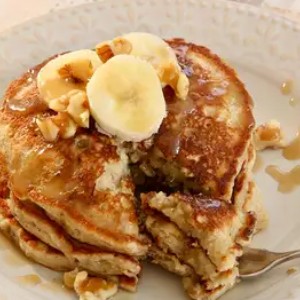
Pancakes are a delicious breakfast option. Adding bananas and walnuts adds a more flavorful taste and provides a nutritious addition. Bananas are an abundant source of antioxidants, fiber, vitamins, and minerals. Walnuts, on the other hand, are packed with vitamins, minerals, antioxidants, and omega-3 fatty acids.
Benefits of bananas in the diet:
- Lowered risk of asthma, cancer, diabetes, and heart disease
- Improved blood pressure
- Improved blood sugar levels
- Reduced formation of kidney stones
- Reduced risk of stroke
- Increased energy and improved memory
- Improved bowel movement and treatment of diarrhea
- Increased calcium absorption results in stronger bones
- Enhanced immune system
Benefits of walnuts in the diet:
- Reduced risk of diabetes, prostate cancer, and breast cancer
- Improved heart health and brain function
- Enhanced immune system
- Weight management
Banana & Walnut Pancake Recipe
Ingredients:
- 1 ½ cups all-purpose flour
- 3 ½ teaspoons baking powder
- 1 tablespoon white sugar
- 1 teaspoon salt
- 3 tablespoons butter, melted
- 1 ¼ cups milk
- 1 egg
- 3 tablespoons mashed banana
- 2 tablespoons walnuts, crushed
Instructions:
- In a large bowl, mix flour, baking powder, sugar, and salt.
- Make well in the center and add in butter, milk, and egg..
- Mix well until the batter comes to a smooth texture and no lumps are visible.
- Add banana and walnuts into the mixture.
- Heat a lightly greased pan over medium-high heat.
- Scoop a quarter cup full of batter and pour it onto the pan.
- Flip it over to the other side once the pancake turns golden brown.
- Serve hot and add thinly sliced banana pieces and chopped nuts on top.
A few more facts:
According to a report released by the National Institute of Aging, women need about 1,600 – 2,200 calories per day while men need about 2,000 – 2,800 calories per day, depending on the level of activity.
Older adults need fewer calories while more focus should be on fiber, high-quality protein, and nutrient-dense foods such as those rich in Vitamin B, Vitamin D, and Calcium.
Although these calories are obtained throughout the day, be sure to start your day right by getting the right amounts of energy in the morning to help you get through your day. A breakfast of champions will help.

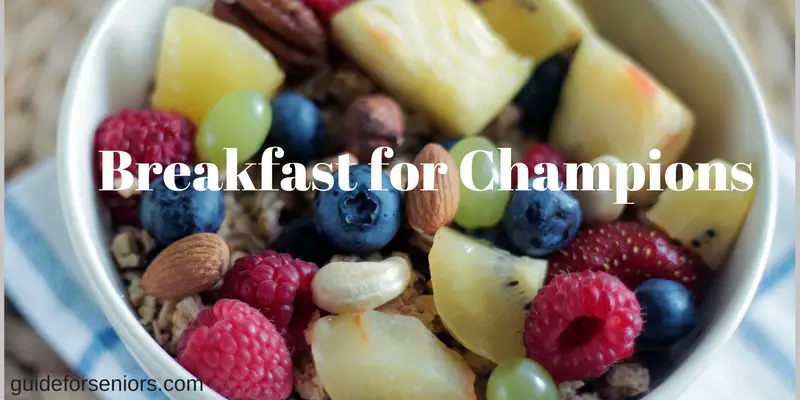


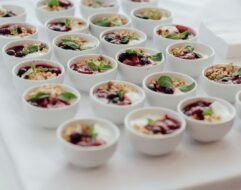




0 Comments